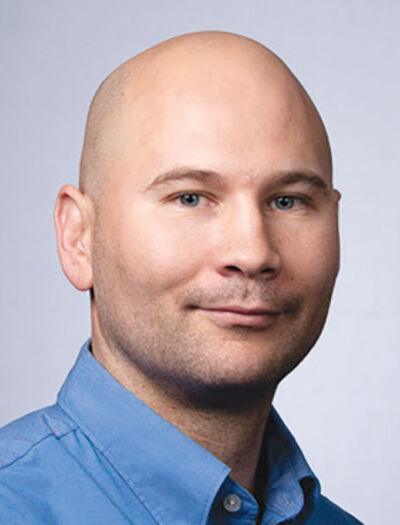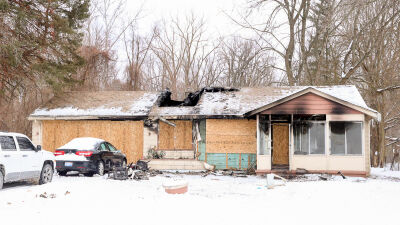SOUTHFIELD — The National Veterans of Foreign Wars’ #StillServing Campaign recognized Southfield veteran Seth Allard for his hard work and dedication to studying suicide and mental health within the military and veteran community.
The #StillServing Campaign recognizes veterans who continue to serve in their community after their service in the military.
Allard actively served in the Marine Corps from 2004 to 2009 and was deployed twice to Iraq, in 2005 and 2010. In 2011, Allard was in the Marine Corps Reserve. In addition to his service, he has been a military spouse for 12 years, allowing him to see both sides of the coin. Upon leaving the military, Allard set out to pursue higher education and study history, a topic that has always interested him. However, Allard changed course when he realized that Marines were not given the skills, knowledge or infrastructure to address mental health problems and succeed.
“Through a series of things and events in my life, I realized that I still had a lot of opportunities. And I felt sort of a continuing sense of duty to continue serving the military community,” Allard said.
Allard is currently pursuing a doctorate in social work at Wayne State University. Over the past 15 years, he has focused his research on suicide and mental health among veterans. Through his research, he has found that the best approach to the mental health crisis within the military community is hands-on. When it comes to his research, Allard views himself as a “servant intellectual,” rather than an academic who remains primarily on campus.
Recently, Allard attended the 360° Leadership Course training event at Joint Base San Antonio, where he began an evaluation partnership that provides leadership training to active-duty noncommissioned officers. Allard is gearing up for even more evaluation activities, including a veteran-led organization that facilitates Camino de Santiago pilgrimages in Spain for veterans of war, and America’s Warrior Partnership, to advocate for military suicide awareness and prevention. He has also worked in case management for geriatric veterans at the Veterans Affairs Ann Arbor Healthcare System. Allard is also a member of the Sault Ste. Marie Tribe of Chippewa Indians.
“It took over 10 years of work and personal development as well to be able to be in a position to actually see some things to come to fruition and to, hopefully, start impacting leaders in our state, our southeastern Michigan area and in our country, to do something that is not usually done with military suicide research, which is actively listening to our military members, instead of just giving them surveys,” Allard stated.
Allard warns against relying heavily on quantitative data rather than viewing the issue of suicide as a whole.
“From my partnership working with America’s Warrior Partnership organization and some of the work that they have put out… the statistics and the findings that come out of their work actually challenge the idea that it’s just 22 veterans a day, or I’ve even heard some statistics where it’s a little bit less, and it also depends on the state and community. It depends on whether it is urban or rural. So, we really do have to be careful with using blanket statistics.”
He expressed that much of what he’s gleaned from his involvement in studying mental health in the military community is that culture needs to be considered and that the culture within both the military and civilian leadership often continues to disregard the voices of struggling veterans. Allard believes that when looking at signs that a loved one is struggling, it’s important to check any preconceived notions at the door and practice the art of empathetic listening.
“It’s a matter of understanding people’s strengths, rather than looking at them as a constellation of risk factors,” Allard said.
Dr. Charletta Dennis, the medical director for behavioral health at Priority Health, is a forensic psychiatrist specializing in inpatient and outpatient psychiatric care for mental health disorders such as anxiety, depression, schizophrenia, bipolar disorder and post-traumatic stress disorder.
Dennis explained that PTSD affects about 9 million people, and often, people assume that veterans are the only patients affected. She said that “it’s actually an anxiety disorder that some people develop after seeing or even living through a traumatic event that either caused or threatened serious harm or death to themselves or someone close to them.”
According to Dennis, some signs of PTSD can include flashbacks or bad dreams that place the individual back into the scenario that traumatized them, avoiding situations that retrigger them, having negative thoughts about themselves, feeling depressed, having difficulty remembering things, and experiencing hypervigilance, which is a sense of hyperarousal which can be triggered by movies, events, sounds, sights and smells. Dennis advises that anyone experiencing some of these symptoms be diagnosed by a trained mental professional and seek treatment. Treatment options vary based on the individual’s needs and the severity of the symptoms. However, common treatments include psychotherapy and medication.
Dennis added that anyone experiencing PTSD or other mental disorders is encouraged to reach out to Priority Health’s behavioral health clinicians, who are available 24 hours a day, seven days a week and can be reached by texting 988 or visiting 988lifeline.org to chat with a suicide and crisis lifeline.
“There is an immense amount of strength and resilience within veterans,” Allard said. “It is the job of (the U.S. Department of Defense), military, civilian leadership and these various institutions that are supposed to be supporting them. It’s their job to give them the resources that they need, listen to them, and then understand what they need. And then get out of the way. If we can accomplish that, I have no doubt in my mind that the military community — especially with a newer generation that is more open to talking about mental health and is more cognizant of the stigma aspects of it — if they’re supported, then sky’s the limit for them achieving their mental, physical, spiritual, emotional and social health.”
 Publication select ▼
Publication select ▼


























